Post by raps on Oct 25, 2009 8:24:59 GMT 8
Interview with Yoshiyuki Tomino
By: Mark Simmons
Date: Oct. 23, 2009
Place: New York
ANN: First, I'd just like to welcome you to New York, and congratulate you on the thirtieth anniversary of Gundam.
TOMINO: Thanks!
You've probably been asked this a lot recently, but how do you feel about the thirtieth anniversary?
It makes me feel I'm getting old, and I'm not happy about that. But I'm happy to have received a lot of compliments from people, and so there's nothing I'm really dissatisfied with. It's a difficult state of mind!
For the twentieth anniversary of Gundam you created Turn A Gundam, and now on the thirtieth anniversary you're creating Ring of Gundam. What are you trying to achieve that's different from what you were doing with Turn A?
There are some fundamental differences. But Ring of Gundam hasn't entered the actual production process, so I can't really explain what's different.
Regarding Turn A Gundam, I made it with the idea of affirmatively accepting all of the Gundam series. In other words, as a creative work, I wanted it to have an affirmative perspective.
In making Ring of Gundam, I'm not thinking about the previous Gundam series. I want to make a work whose main question is whether or not our twenty-first-century civilization can continue into the near future. A work whose theme is whether our current way of thinking can continue into the near future.
In thinking about whether our current way of thinking could continue into the future, I decided to make a story that said it might not. It's a negative theme, but I wanted to see if I could make the story a little lighter by making it as a Gundam series.
That's because Gundam is basically fantasy. I think that, in fantasy, even dark stories can be made in a light way.
(In English) I'm very sorry. I want to tell you about the story, [but it's] a very complex story...
So are fantasy stories a particularly good way of talking about dark aspects of the world?
That's the nature of fantasy stories, because fantasy stories were originally told to give people hope. They're pure fiction, but fantasy is a way of creating a story which gives people hope even though they know it's not true. Even for people who know it's fiction and a dream, it's a story of hope.
(In English) I have one example, thinking of fantasy. British people believe the stories of dragons...
(Continuing in Japanese) That is, they believe the stories about the knight who slays the dragon. Because of that, in the colonial era, the British had the heart to go and take control of colonies on the other side of the world.
The stories of knights and dragons express the hopeful heart of the British people. Fantasy can express things in such a way, so it's not always fiction. In other words, these old myths and legends may be fiction, but they express the hearts of the people who tell them... their "origin spirit."
And so I think a fantasy like Gundam can show a dark future in a light way.
In the pre-interview we did, you described the ending of Ideon as being a hopeful ending despite all the bad things that happen to the characters. Is that true of all your works, that there's always some hope?
When I created Ideon, I didn't understand the fundamental power of fantasy the way I do now. The ending of Ideon was still just a hopeless ending, and so it couldn't become a fantasy.
Going back to Ring of Gundam, [based on the 5-minute promotional clip for the series shown at New York Anime Festival] I gather that the character movements of Ring of Gundam are based on those of the actors, motion-capture style. Do you think this is closer to directing live action?
Yes. I feel that anime and live action are basically the same thing, and so I directed it like live action.
But when I actually tried it, I found one thing very confusing. The timing of live action movement is slower than that of anime. My mistake was that I couldn't calculate this difference in timing, and that can be seen in Ring of Gundam.
And so, in the current Ring of Gundam, there are a few directing mistakes because of the different movement speed. But it's already been filmed.
What stage of production is Ring of Gundam at?
It's finished for now.
So that promotional clip is all there is for now; were Ring of Gundam to enter into full-length production, how long would it be? Are you thinking TV series or movie or OVA?
I'm not sure, but I'd like to create a work about the length of one film. But we haven't found any investors, perhaps because they're afraid I'd make a lot of requests.
What other challenges did you have in integrating computer graphics into your work, aside from the timing?
I did take on one challenge with Ring of Gundam. I'd become uncertain about how to depict characters in CG. I didn't want to do it like Pixar, or like the 3D characters in current games. I thought there must be another way.
(In English) I wanted to challenge the drawing of CG characters. I believe that different drawing and design...
(Continuing in Japanese) But we don't have staff who can think of such new things. Right now we only have Pixar-like designs and game-like designs, and there's nobody who is artistic in the true sense. I think the ideal would be to represent hand-drawn anime as is. I'm recalling one really bad example...
(In English) Astro Boy in 3D. Terrible!
(Continuing in Japanese) I think the original drawings are far superior to the CG characters. If I had a choice between a hand-drawn Mickey Mouse and a CG Mickey Mouse, I'd go with the hand-drawn Mickey Mouse. There must be something in between.
I think people are very interested in the idea that you worked on the original Astro Boy. One other thing, though, that I think isn't as well known among Western fans is the sheer number of anime that you've worked on, doing storyboards or "conte." I think the rumor is that you've done one thousand conte...
Yes, I have.
What did you learn from all that work?
Understanding different types of stories becomes an asset when you create your own works. So having the opportunity to work on storyboards for so many different types of story was an asset for me.
In your own work, you also do a lot of your own storyboards. Are you unusual among directors? Do you do more of the storyboards for your own work than other directors do?
I don't know of any recent examples, but such people do exist. So I don't think it's so unusual. And in a TV series, many episode directors are involved in creating the story as well.
Here's something a lot of people have mentioned to me. You recently gave a keynote at a video game conference, where I believe you said that video games are evil.
Yes, they're evil. Because they just steal people's time.
Do you think the people who make video games could change them into something more meaningful or worthwhile?
I don't think they can. But in the twenty-year history of video games, one good thing is that the technology they've produced feeds back to the real world. Video game hardware is endurance-tested by hundreds of thousands of people, and that helps establish computer systems that can be used in the real world. So the fact that video game hardware still exists isn't meaningless.
I don't know much about technical things, but I think at the very least, it's thanks to computer games that we were able to develop the programs and hardware to make mobile phones as small as they are now. The fact that the game industry has taken on so many technological challenges has been a big help to the computer industry. Although the games themselves are worthless, in that sense they've been a good thing.
So computers themselves are good, in your opinion?
Yes, of course. It's basically a question of how they're used, although I don't think we've been able to use that technology in a way that lives up to its high potential. For example, was it a good idea to make it possible for this fool to cross the Pacific Ocean in five or six hours? I think that may be excessive...
One more question on Ring of Gundam. There's a key phrase in there about "Amuro's memory"...
(Laughs) I haven't thought about that yet. Another director said that I should insert a phrase like that as a kind of foreshadowing, to appeal to the fans. Now I'll really have to think about what it is!
Speaking of "Amuro's memory," it does seem that in your recent work there's a theme of sending messages between the generations. I'm thinking also of Wings of Rean, and the character of Sakomizu, who is from the past of Japan...
Yes. As I've gotten older, I've been thinking about what older people should do. I think the one thing that older people have to do is to acknowledge their own mistakes, and pass that on to the next generation. I've seen a lot of older people who just boast about what they've done, and that really bothers me. Even if they don't think they're always right, a lot of them just want to be recognized for their achievements. I want to make an effort not to be like that.
So is there a message that you would want to send to the future, a hundred or two hundred years from now? What would Tomino's message to the future be?
I don't have an answer to that question. That's because I don't think there will be anyone two hundred years from now who will listen to what we have to say.
You may not understand what I mean, but with Ring of Gundam, I want to make a story that will explain it.
Source: animenewsnetwork
The 30th anniversary Gundam would be "Ring of Gundam" and as per Tomino-san video games are bad hehehe!!!
By: Mark Simmons
Date: Oct. 23, 2009
Place: New York
ANN: First, I'd just like to welcome you to New York, and congratulate you on the thirtieth anniversary of Gundam.
TOMINO: Thanks!
You've probably been asked this a lot recently, but how do you feel about the thirtieth anniversary?
It makes me feel I'm getting old, and I'm not happy about that. But I'm happy to have received a lot of compliments from people, and so there's nothing I'm really dissatisfied with. It's a difficult state of mind!
For the twentieth anniversary of Gundam you created Turn A Gundam, and now on the thirtieth anniversary you're creating Ring of Gundam. What are you trying to achieve that's different from what you were doing with Turn A?
There are some fundamental differences. But Ring of Gundam hasn't entered the actual production process, so I can't really explain what's different.
Regarding Turn A Gundam, I made it with the idea of affirmatively accepting all of the Gundam series. In other words, as a creative work, I wanted it to have an affirmative perspective.
In making Ring of Gundam, I'm not thinking about the previous Gundam series. I want to make a work whose main question is whether or not our twenty-first-century civilization can continue into the near future. A work whose theme is whether our current way of thinking can continue into the near future.
In thinking about whether our current way of thinking could continue into the future, I decided to make a story that said it might not. It's a negative theme, but I wanted to see if I could make the story a little lighter by making it as a Gundam series.
That's because Gundam is basically fantasy. I think that, in fantasy, even dark stories can be made in a light way.
(In English) I'm very sorry. I want to tell you about the story, [but it's] a very complex story...
So are fantasy stories a particularly good way of talking about dark aspects of the world?
That's the nature of fantasy stories, because fantasy stories were originally told to give people hope. They're pure fiction, but fantasy is a way of creating a story which gives people hope even though they know it's not true. Even for people who know it's fiction and a dream, it's a story of hope.
(In English) I have one example, thinking of fantasy. British people believe the stories of dragons...
(Continuing in Japanese) That is, they believe the stories about the knight who slays the dragon. Because of that, in the colonial era, the British had the heart to go and take control of colonies on the other side of the world.
The stories of knights and dragons express the hopeful heart of the British people. Fantasy can express things in such a way, so it's not always fiction. In other words, these old myths and legends may be fiction, but they express the hearts of the people who tell them... their "origin spirit."
And so I think a fantasy like Gundam can show a dark future in a light way.
In the pre-interview we did, you described the ending of Ideon as being a hopeful ending despite all the bad things that happen to the characters. Is that true of all your works, that there's always some hope?
When I created Ideon, I didn't understand the fundamental power of fantasy the way I do now. The ending of Ideon was still just a hopeless ending, and so it couldn't become a fantasy.
Going back to Ring of Gundam, [based on the 5-minute promotional clip for the series shown at New York Anime Festival] I gather that the character movements of Ring of Gundam are based on those of the actors, motion-capture style. Do you think this is closer to directing live action?
Yes. I feel that anime and live action are basically the same thing, and so I directed it like live action.
But when I actually tried it, I found one thing very confusing. The timing of live action movement is slower than that of anime. My mistake was that I couldn't calculate this difference in timing, and that can be seen in Ring of Gundam.
And so, in the current Ring of Gundam, there are a few directing mistakes because of the different movement speed. But it's already been filmed.
What stage of production is Ring of Gundam at?
It's finished for now.
So that promotional clip is all there is for now; were Ring of Gundam to enter into full-length production, how long would it be? Are you thinking TV series or movie or OVA?
I'm not sure, but I'd like to create a work about the length of one film. But we haven't found any investors, perhaps because they're afraid I'd make a lot of requests.
What other challenges did you have in integrating computer graphics into your work, aside from the timing?
I did take on one challenge with Ring of Gundam. I'd become uncertain about how to depict characters in CG. I didn't want to do it like Pixar, or like the 3D characters in current games. I thought there must be another way.
(In English) I wanted to challenge the drawing of CG characters. I believe that different drawing and design...
(Continuing in Japanese) But we don't have staff who can think of such new things. Right now we only have Pixar-like designs and game-like designs, and there's nobody who is artistic in the true sense. I think the ideal would be to represent hand-drawn anime as is. I'm recalling one really bad example...
(In English) Astro Boy in 3D. Terrible!
(Continuing in Japanese) I think the original drawings are far superior to the CG characters. If I had a choice between a hand-drawn Mickey Mouse and a CG Mickey Mouse, I'd go with the hand-drawn Mickey Mouse. There must be something in between.
I think people are very interested in the idea that you worked on the original Astro Boy. One other thing, though, that I think isn't as well known among Western fans is the sheer number of anime that you've worked on, doing storyboards or "conte." I think the rumor is that you've done one thousand conte...
Yes, I have.
What did you learn from all that work?
Understanding different types of stories becomes an asset when you create your own works. So having the opportunity to work on storyboards for so many different types of story was an asset for me.
In your own work, you also do a lot of your own storyboards. Are you unusual among directors? Do you do more of the storyboards for your own work than other directors do?
I don't know of any recent examples, but such people do exist. So I don't think it's so unusual. And in a TV series, many episode directors are involved in creating the story as well.
Here's something a lot of people have mentioned to me. You recently gave a keynote at a video game conference, where I believe you said that video games are evil.
Yes, they're evil. Because they just steal people's time.
Do you think the people who make video games could change them into something more meaningful or worthwhile?
I don't think they can. But in the twenty-year history of video games, one good thing is that the technology they've produced feeds back to the real world. Video game hardware is endurance-tested by hundreds of thousands of people, and that helps establish computer systems that can be used in the real world. So the fact that video game hardware still exists isn't meaningless.
I don't know much about technical things, but I think at the very least, it's thanks to computer games that we were able to develop the programs and hardware to make mobile phones as small as they are now. The fact that the game industry has taken on so many technological challenges has been a big help to the computer industry. Although the games themselves are worthless, in that sense they've been a good thing.
So computers themselves are good, in your opinion?
Yes, of course. It's basically a question of how they're used, although I don't think we've been able to use that technology in a way that lives up to its high potential. For example, was it a good idea to make it possible for this fool to cross the Pacific Ocean in five or six hours? I think that may be excessive...
One more question on Ring of Gundam. There's a key phrase in there about "Amuro's memory"...
(Laughs) I haven't thought about that yet. Another director said that I should insert a phrase like that as a kind of foreshadowing, to appeal to the fans. Now I'll really have to think about what it is!
Speaking of "Amuro's memory," it does seem that in your recent work there's a theme of sending messages between the generations. I'm thinking also of Wings of Rean, and the character of Sakomizu, who is from the past of Japan...
Yes. As I've gotten older, I've been thinking about what older people should do. I think the one thing that older people have to do is to acknowledge their own mistakes, and pass that on to the next generation. I've seen a lot of older people who just boast about what they've done, and that really bothers me. Even if they don't think they're always right, a lot of them just want to be recognized for their achievements. I want to make an effort not to be like that.
So is there a message that you would want to send to the future, a hundred or two hundred years from now? What would Tomino's message to the future be?
I don't have an answer to that question. That's because I don't think there will be anyone two hundred years from now who will listen to what we have to say.
You may not understand what I mean, but with Ring of Gundam, I want to make a story that will explain it.
Source: animenewsnetwork
The 30th anniversary Gundam would be "Ring of Gundam" and as per Tomino-san video games are bad hehehe!!!

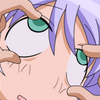
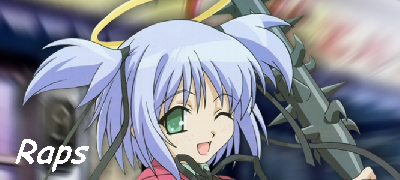


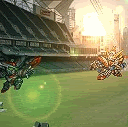
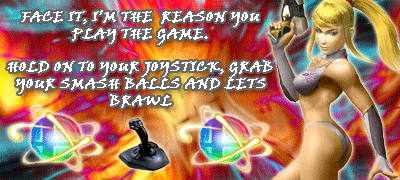

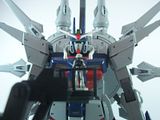




 Some anime's are meant to stay in hand-drawn style.
Some anime's are meant to stay in hand-drawn style.
 keeping the site active as a place to dump info for easier backtracking.
keeping the site active as a place to dump info for easier backtracking.